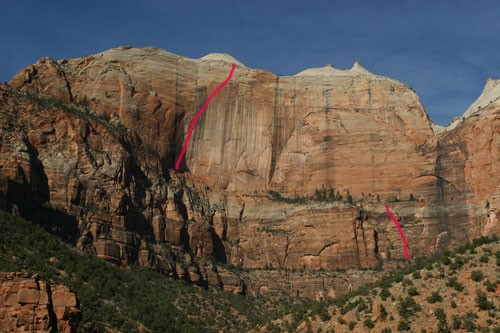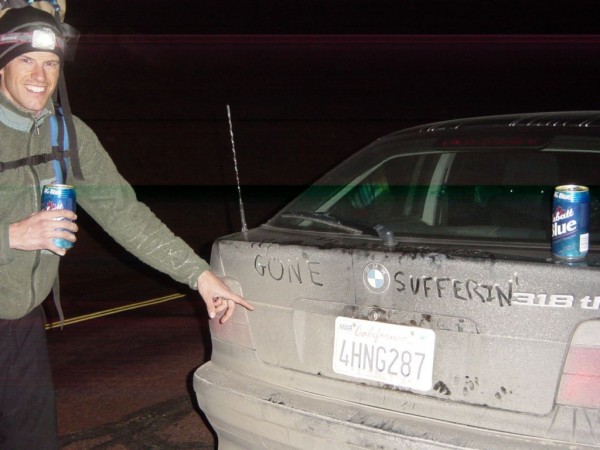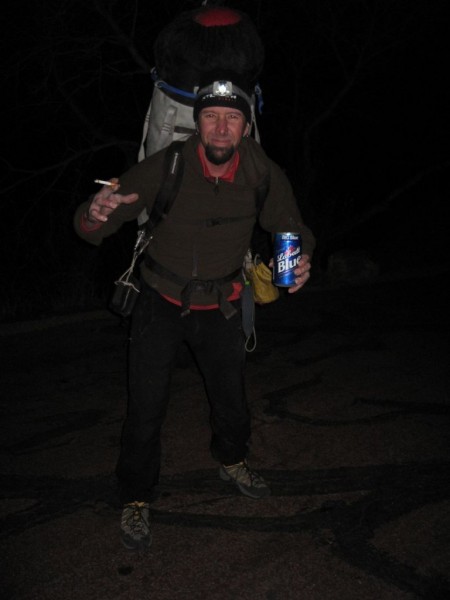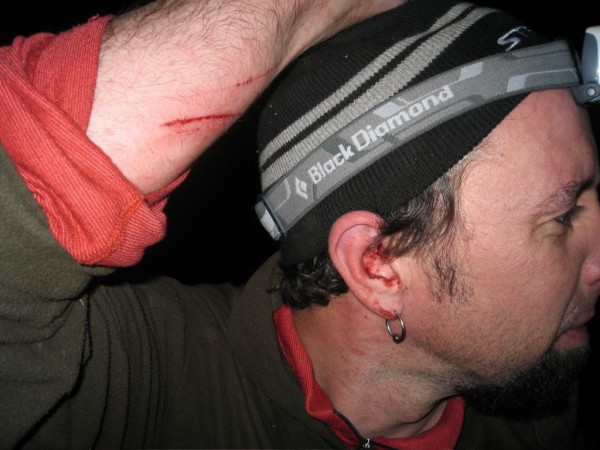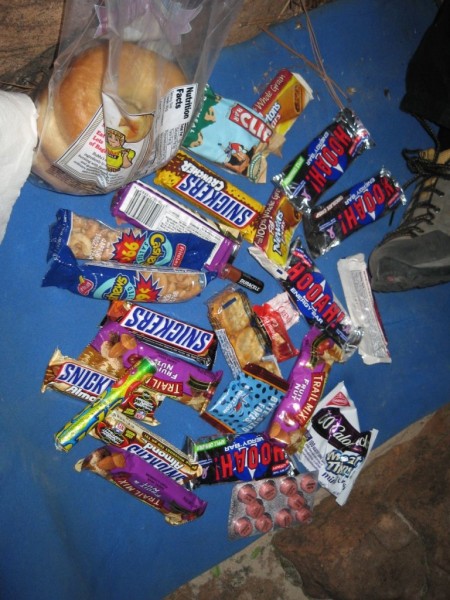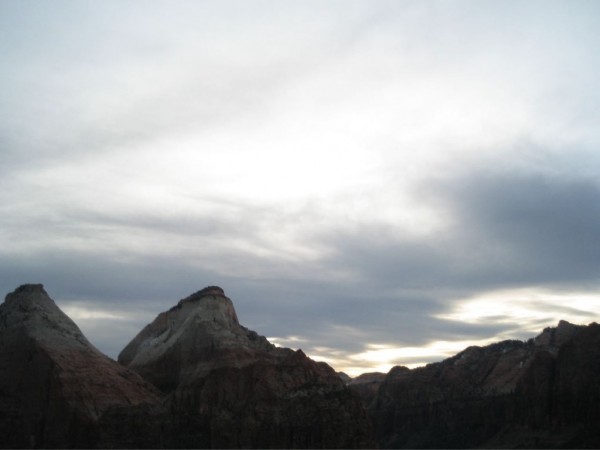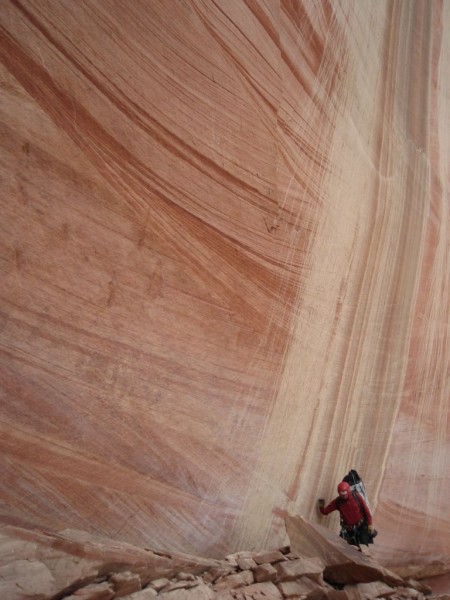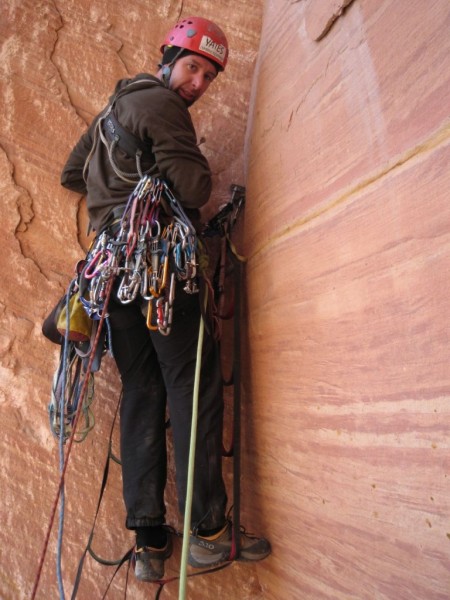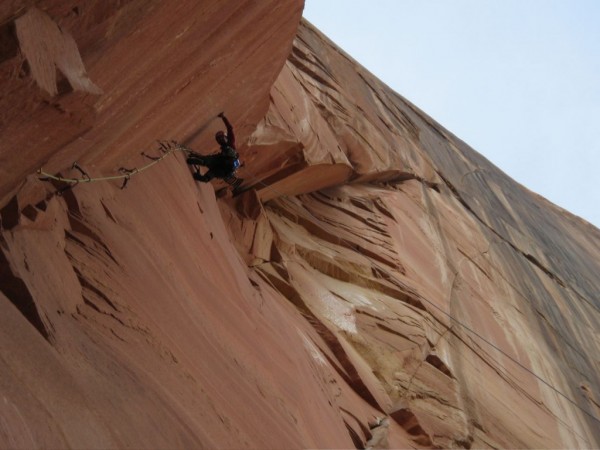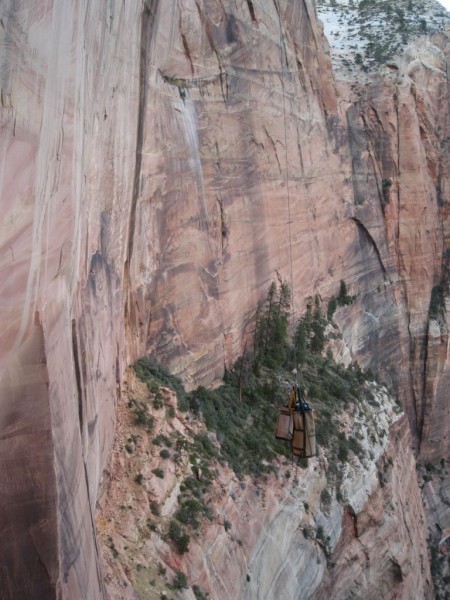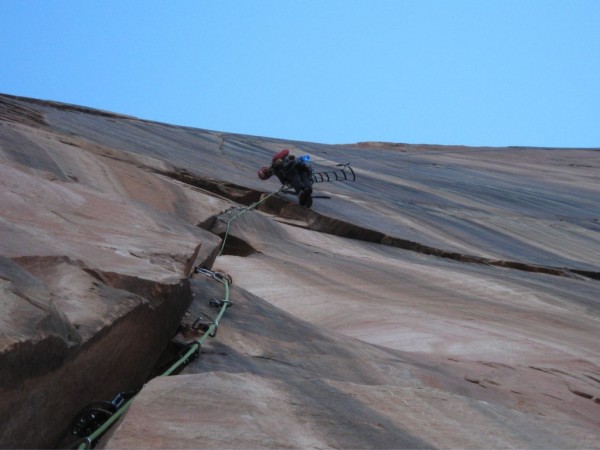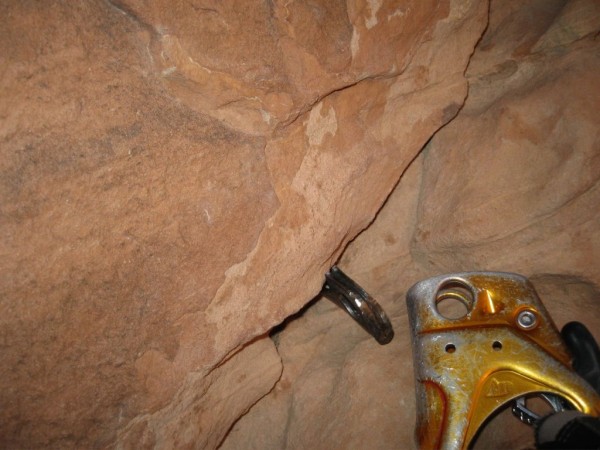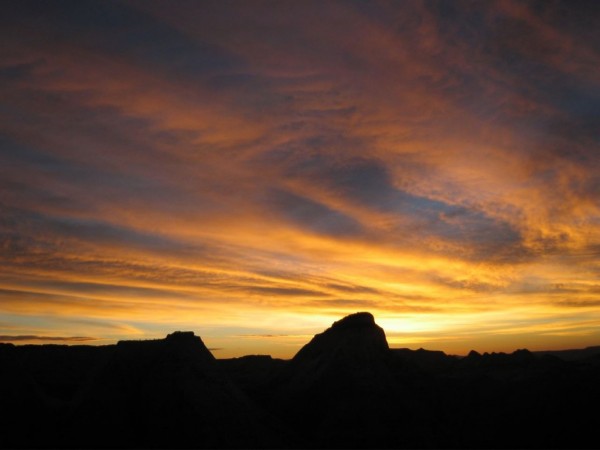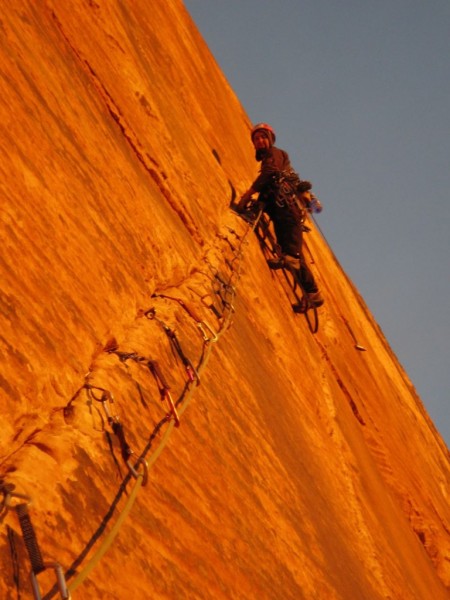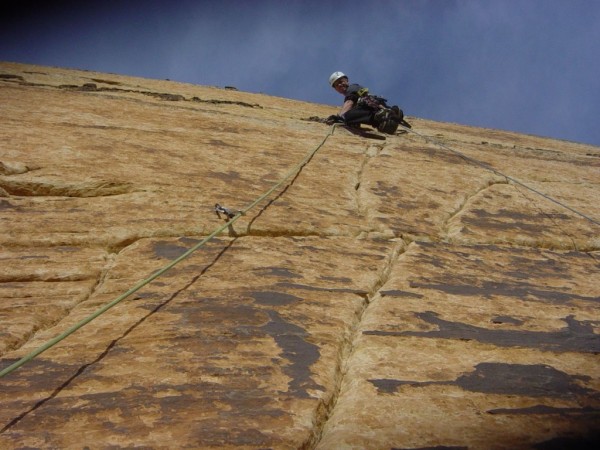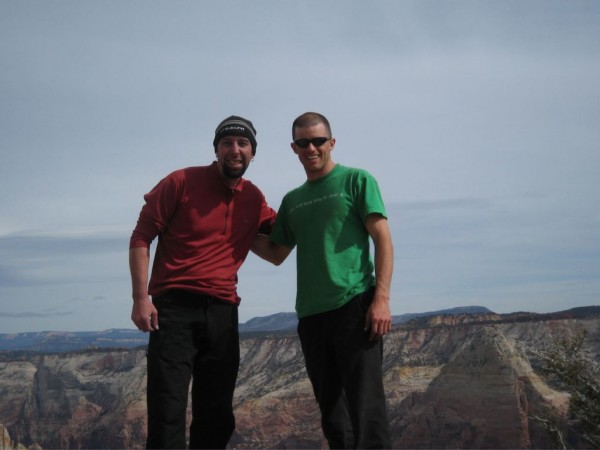Instead, I looked back at him and said, “We don’t really NEED that, do we?” After all, we had never done a speed wall together that would take so long that you would need a belay seat.
“Are you kidding?” he shot back, looking a little confused.
Suddenly I got it. “Whoa. Its going to be one of THOSE walls?”
“Yeah man. You have no idea the suffering you are getting into.”
Ammon left for the car and I turned to Tacy who was graciously lettinging us stay in here house and half jokingly asked. “So, know anyone else interested in climbing the Streaked Wall.”
But it was too late. I was committed. We were going to suffer. The only thing left to do was to turn bad suffering into good suffering. So we stopped at the market and bought four of the largest canned beers we could find.
Ammon geared up with stereo, cold one, camera, and magic yellow bag. Barely visible is the portable stereo he bumped up the whole approach.
For me, the suffering started on the first step around 7pm. I couldn’t find the waste belt for the grade VI haul bag I was carrying. Why so much stuff on a speed ascent? Our topo didn’t have a rack for the route, so we had to bring a lot of stuff including bivy gear for the base.
The suffering for Ammon started just before we got to the bivy below Rubicon Ledge. On our drunken stumble to base, a rock came out from under him and he went carwheeling into the bush. Luckily a tree stopped his tumble. Unfortunately, that same tree lashed out at him. Ammon described the experience: “it felt like someone stabbed my ear with a chopstick.”
Got to the base around 11pm and took inventory of the food. It seemed like a lot. What we didn’t realize was this was to be all our food for almost 48 hours.
That morning we woke to cloudy skies. We had neglected to check the weather so we called our friend Heidi who had internet weather access.
“So, what is the weather report? Looks a little ominous right now.”
She reported a 20% chance or rain. The real weather wasn’t supposed to come until the following night. And added a little dig, “You guys aren’t looking for a reason to bail are you?”
I started leading at 7:50am. After two hours, (about half spent hauling our surprisingly heavy load), we got to Rubicon Ledge. We were just getting ready to keep hiking when ammon turned to me “Dude, where is my other aider.”
We looked everyone and couldn’t find it. So the only thing left to do was rappel. Ahh, more suffering. Sure enough, 190 feet below us, Ammon’s aider barely clung to the rock. It had mysteriously unclipped itself. It wasn’t the only item that would mysteriously take flight during the climb.
Next we got to schlep our gear across Rubicon Ledge. This wasn’t just your typical “move belay left” maneuver. We spent two hours bushwhacking, cactus dodging, scrambling and hauling loose 5th class.
We spent 10 minutes debating what crack system was actually the route. Turns out the guy who writes guidebooks for a living (me) was off by, well, a lot. Luckily we followed Ammon’s intuition. Not that I am trying to justify me missing the start of the route by 200 feet, but our topo was not exactly detailed. It had a diagonal line and 9 belay locations. Only the two ten foot free sections were rated. There was no gear list. The route wasn’t even rated. The topo just said PDW for Pretty Darn Western. I had no idea what that meant. But I would soon. Oh, would I ever.
There were no belay bolts for the fist pitch. So the belay was Ammon’s first piece: a knifeblade that shifted so much on the bounce test that he placed another one above it. I was too busy appreciating the last ledge we would see for the next 22 hours to be too worried about him blowing the piece and taking us on the 800 foot tumble to the ground. As I learned from Ammon, often on hard aid, being a little scared is fine. Being too scared is debilitating. So sometime you just have to trick you mind and say “F*#k it, I don’t really care if I take the whip.”
The first pitch was mostly nailing and the route stayed that way to the top. Occasionally the crack would open up and take some cams. But for the most part it was just beaks, blades and angles with stoppers here and there.
On pitch 2, I bit into a Hooha bar which was the US military’s contribution go the energy bar market. Suddenly the rope jerked me to the right side of the belay. I looked up and Ammon was 30 feet below his last piece, a bolt. The feature he was hooking had crumbled while he was standing on it.
“Nice one, bro” I said “how far did you sail?”
“I don’t know, I guess 50?” he replied
“Did you start to hear the air?”
“yep”
“then you went at least 50. After 50, you start to hear the air rush by.”
I used to be terrified when my partners fell. But with Ammon, it was expected that he take at least one big whipper per route. I think that’s the reason he is probably the fasted aid climber out there. He just goes for it. He explained later how he manages fear “Yeah, sometimes you just gotta trick yourself by almost wanting to take the whipper. Then your not as scared and you can move fast.”
The streaked wall makes the right side of el cap look low angle. The bottom pitches are especially overhanging. Check the bags on the second pitch:
The third pitch looked vertical from below. In realitiy, it was overhanging the whole way. It just relatively less steep than the first two pitches.
At the fourth pitch, I took over right as it got dark. The night shift began.
Ammon turned to me “when was the last time you led hard aid on sandstone?”
“Seven years ago,” I replied
“Oh boy. You are in for a good time!”
I prefer climbing hard aid at night. The only thing worse than standing on a crappy aid placement, is seeing the last five crappy placements below you. Ignorance can be bliss when aid climbing. And when you can only see for 5-10 feet above and below, you are quite ignorant of monster whip potential.
I didn’t find this out till later, but this was the only named pitch on the route: “Good Friday the Thirteenth.” The pitch started out fine. Sinker blades and beaks led to relatively secure sawed angles. Then things started to get tricky. I came up to giant scars in sandy soft rock. Spent a long time messing around with stacking sawed angles behind blades. Occasionally I could get stacked beaks, which felt relatively secure. Once I was through this section, I clipped a bolt and saw another bolt above. “15 feet to the belay” I called down.
What I thought was the belay was just a stud with tape wrapped around it. I looked down at “ammon, uhh never mind.”
“Yeah dude, he yelled up, you are only like 70 feet out so far.” My heart sank.
Next I had to top-step and hand place and angle in a drilled holes. All over the route, instead of drilling bolts, there were often just holes. You could sometimes put an angle in them, but it was usually better just to hook. The angles were so loose in the holes, hooks felt more secure. Next came more giant blown out scars in sandy rock. I fell into a psychological tail spin.
Every time I thought I was through a hard section, another one showed up. This was the steepest and most sustained tricky aid I had delt with. Everything was blown out. I prayed that every once in while I could get just a 10-15 foot section of cams. But it didn’t happen. I began to crack. I wanted to lower back to the anchor and have Ammon finish the pitch. I know it was pathetic, but I didn’t care. Fortunately Ammon was having none of it. We probably didn’t have enough rope to lower back to the belay… and there wasn’t any good gear to lower off.
“Dude, I think you will feel a lot better if you finish the pitch.”
He sent up some food and water. Somehow I ended the mental melt down and was able to finish the pitch. When ammon got to the belay, I slumped in the belay seat with my legs buried into our haulbag to keep warm. I didn’t care that I was such a sorry sight. At least I wasn’t leading anymore. “Don’t worry, bro,” he assured me ”as far as melt-downs go, it wasn’t that bad.”
Pretty Darn Western had kicked my ass. And it stayed just as Western for Ammon’s pitches. The rock was just as sandy and blown out. But somehow Ammon just charged through and stayed psyched. Maybe it was because he had the stereo going the whole time playing everything from Manu Chao to Dre. Dreto folk music. Halfway up Pitch 5, however, I heard the psyche leave his voice.
“We are in trouble. We are definitely in trouble. Send me your hammer!”
Ammon had reached down to grab his hammer only to find the screw that went into the shaft had come out. His hammer silently fell 1000 feet to the ground. it wasn’t the end of the world, but it meant that we couldn’t short fix anymore, which is the key to moving fast on these climbs. With only one hammer, ammon would have to send it back to me on the haul line and then wait for me to clean the pitch without being able to continue the lead. On a nailing route, where it takes a long time to clean pitches, this meant our speed ascent was about to slow way down.
After the next pitch, around 4am, we forgot to get the hammer back to me. The pitch traversed and was overhanging. Once the bag was gone, there was no way to swing the hammer back to me. Was I going to have to leave all 15-20 pins that Ammon had placed?
Fortunately, the rock was so bad, I was able to wiggle out the first two pins with my hands. Then I had an idea: I took my bottom ascender and started beating the pins with it. Sure enough, the rock and placements were so bad, I was able to clean almost every pin on the pitch using my ascender as a hammer. Other pins just popped out when I weighted the rope. How far would Ammon have fallen on this pitch had he blown a piece? I don’t know. When you can clean almost every piece with your hands or an ascender, its hard to imagine what would have stopped his fall.
Finally, darkness turned to light.
Around 7am, the wall started to light up.

Visit on chrismcnamara.com
Ten minutes later, the wall was on fire.
Ammon’s last aid pitch was on of the scariest. 7 placements popped when I weighted the rope to clean it. Bad rock, self-cleaning placement.
I took back over the lead around 8am. The climbing went like this: 20 feet of bat hooks in soft rock, bolt, 20 feet of bat hooks in soft rock, bolt.” But after all those blown out pin scars on my earlier lead, the bat hooks felt secure.
On the topo, the last pitch looked light. But I was wrong. Oh, was I ever wrong. after 20 feet of free, I clipped a bolt and looked up at 30 feet of overhanging sugar. I could see a bolt 25 feet and no way to get there. Finally I found a 1-inch diameter bat hook hole top stepped an felt around to a big hole. After one of the worst pin stacks of my life (the pins came out when I unweighted them), I found one found the worst bolts I had ever seen. It stuck out almost 3 inches. But that wasn’t the scary part, when I got up to look at it, I could see that it was a ˝ bolt in what was in a 1 inch hole. And of course, all this sugar climbing was right above an ankle-breaking slab. When would suffering ever end!! Fortunately it ended just a few minutes later when I free climbed off the last bolt and was on top 22 hours and 18 minutes after leaving Rubicon Ledge. It was 27+ hours since we had left our bivy and would be 44 hours car to car. We were both tired but psyched the suffering had come to an end.
Or was it really suffering? Ammon and I debated this for a while. We were both only hating life for a small percentage of the climb. Otherwise it was just another fun climb full of laughing and hanging out. We eventually decided it was suffering, but it was really good suffering. The type where the next day you are already laughing at all the pain and planning another adventure with plenty of potential punishment.
You can view more photos of the climb in a quicktime slide show:
BIG - 22mb: http://www.chrismcnamara.com/movies/rodeo_queen_720.mov
LESS BIG - 8.4 mb: http://www.chrismcnamara.com/movies/rodeo_queen_320.mov
The best thing to do is right click on the link and "save target as" or "save linked file" to your desktop.
You need the latest version of quicktime to watch this. to download this free software, go here: http://www.apple.com/quicktime/
PS: for future ascents, the topo at the visitor center works fine. even though its not that detailed all you really need to know is that the first 7 pitches are all A3/A4 and the last two have some 5.8.
The Rack:
10 beaks
10 bigger beaks/tucans etc
6 blades
10 bugaboos
6 lost arrows
3 ea. baby angle
3 ea. sawed angles to 1 1/2"
2 sets offset nuts
2 sets nuts
cams: 3 ea. .4-1.5"
2 ea 1.75-4.5"
2 grappling hooks
all belay (except at Rubicon) are bomber
